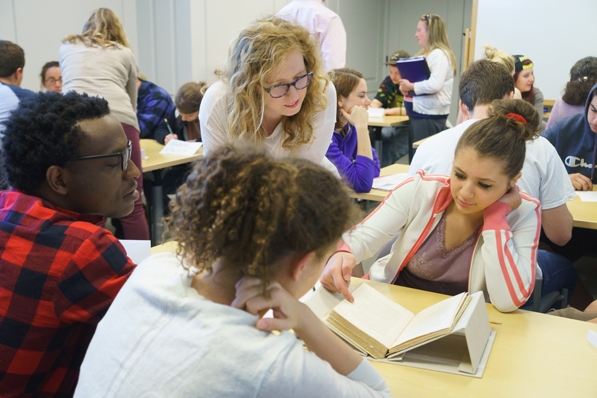The thunderstorm that knocked out electricity on campus May 27 did nothing to deter a crowd from assembling in Collis Center’s One Wheelock, where backup power kept the lights on for an unusual performance of original and found spoken word poetry.
Bringing the chatty if somewhat damp group of students, friends, faculty, and community members to order was Wendy Tucker, an English teacher at Ledyard Charter School, an alternative high school in Lebanon, N.H., for students who have struggled with mainstream public education.
Tucker got right to business. “I’m super proud of all my students who came out today—so let’s get started.”
Students as Ambassadors for the Humanities
For most of the term, Ledyard Charter students have collaborated with 13 Dartmouth undergraduate members of Ivy Schweitzer’s “English 27: American Poetry” course to learn about—and create—expressive verse.
“English 27” is an experiment in community-based learning, says Schweitzer, a professor of English and of women’s and gender studies. It’s a model she was introduced to by colleague Pati Hernandez, a lecturer in women’s and gender studies with whom Schweitzer has collaborated for several years on a project that brings Dartmouth students—as part of a for-credit course—into prisons, drug-rehabilitation centers, and homeless shelters for art and storytelling workshops.
Thanks to funding from the William Jewett Tucker Foundation and the English department, the “English 27” students have made a weekly Advance Transit bus trip to the Lebanon-based school to write poetry with the Ledyard Charter students.
The high school students have, in turn, traveled to Hanover to participate in class discussions of Edgar Allen Poe, Emily Dickinson, and Walt Whitman, among other major American poets.
“I’ve tried to take the Dartmouth students out of their comfort zone,” says Schweitzer. “They have to sit in the classroom with the high school students and enter into that world. And when the high school students come to us, they get the experience of sitting in a college classroom at Dartmouth, which most of them never thought they would ever do.”
Tucker says, “It’s a great opportunity for my kids to experience college. A lot of them are now considering going to college, which was not the case before.”
“I really enjoy coming to Dartmouth,” says Charter student Jenna Lambert. “It’s cool getting to meet college students and see what college is all about.”
In addition to joining regular class sessions, the Charter students and their Dartmouth counterparts visited Rauner Special Collections Library to examine first editions of Dickinson and Whitman.
“I like being able to hold a real piece of history in your hand,” says Gage Desilets, a Charter senior who is planning a career in the Marine Corps.
Timothy Swensen ’16, an environmental studies major and economics minor, says having the high school students participate in the class has shifted how he thinks about community service. “I’ve always been into community service as an extracurricular, but it’s amazing to see how meaningful this is as part of a class,” he says. “These high school students have the ability to be on par with us Dartmouth kids. That’s something you couldn’t know by just going and working outside of Dartmouth.”
“The students in my class are all poetry geeks—they just want to sit around and talk about poetry,” says Schweitzer. “So they’re good ambassadors for public humanities. Poetry is not elitist, it’s not heady and intellectual—it’s down-to-earth. It’s about authentic issues, passions, who we are, identity, problems, love, existence, death, eternity, all those great questions. Can we open up poetry so that it becomes a medium that everybody can use to express their essential human condition?”
Of the community-based learning model, she says, “It’s more work, but especially for humanities courses, it’s a way of showing how the humanities are relevant and can absolutely transform and enrich the lives of younger students. That’s my passion these days.”
United by Poetry
The performances at One Wheelock included original poems and songs as well as recitations of the work of well-known poets, from Poe to Mary Oliver. Themes ranged from baseball to gender identity to coming to terms with the challenges of growing up.
Some of the Charter students brought prerecorded videos of their entries, which were warmly received by the audience, despite some technical difficulties. Others explored the perhaps unlikely common ground they had discovered with their Dartmouth student partners. In “New Beginnings,” for example, Desilets and Kendall Calcano ’18 traded verses comparing the experience of Marine Corps training with first-year orientation at Dartmouth.
“Poetry really unites people,” Swensen says. “I’m happy that I found this kind of class, because it adds an emotional aspect to education that sometimes can be lacking.”
Swensen (who served as a self-effacing emcee for the event) and John Gilmore ’17 collaborated with Ben Seamans and Nick Acker from Charter to perform “Call of the Wild,” a sound-poem in the style of avant-garde poetry group The Four Horsemen—no words, but a few chest thumps and plenty of dynamic drama.
“You might not be able to tell when it ends,” Swensen warned the audience, “but you can applaud when you hear ‘meow.’” The crowd cheerfully obliged.
